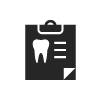The Canadian Dental Association recommends taking your infant to the dentist for their first appointment when their first tooth erupts, or at 12 months of age.
The initial visit can help your child become comfortable with their dentist and establish a trusting relationship. This appointment will include a quick check of their teeth and gums. Following visits should be every six months.
3 Reasons to Bring Your Child to The Dentist Early
- Build trust. Showing trust in your dentist can teach your child that visits to the dentist are safe and important to their health.
- Check technique. Find out if the teeth cleaning routine at home is working. If spots are being missed, early discovery is key to keeping those teeth healthy!
- Proactive approach. By visiting the dentist every six months, your dentist can be proactive and catch any developing issues early.
Baby teeth have a thinner layer of enamel than adult teeth, which puts them are greater risk of tooth decay. Tooth decay can be painful, impacting your child’s overall health. It can also trigger issues with sleeping, speaking or eating, as well as their ability to focus or learn.
Tips to Encourage Good Dental Care for Your Child
- Begin even before the first tooth appears! Using a clean, damp cloth, wipe your baby’s gums twice a day.
- Avoid offering bottles prior to naps or bedtime. If you can’t avoid it, try using water instead of milk or juice to avoid decay. Limit time with a bottle to five minutes or less to help prevent the development of orthodontic issues.
- Take your child for their first dental visit around 12 months of age.
- At the first sign of a tooth, brush your child’s teeth daily using a soft-bristled toothbrush and a very small amount of fluoride-free toothpaste until they’re old enough to spit it out (typically around 3 years old).
- Let your child practice brushing by copying you, then finish for them, making sure that all surfaces have been cleaned. Your child will need help with brushing until they’re about 8 years old.
- Teach your child to brush for two minutes twice a day.
- Replace toothbrushes every few months or when they begin to show signs of wear, such as flattening or bushy bristles.
- Bring your child for regular dental visits. Every six months is optimal, but this may vary depending on your dentist.

